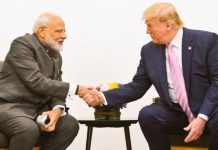The court delivered the landmark ruling with an aim to insulate the poll panel from the executive pressure and to ensure that elections are held in a free and fair manner. The Bench held that this norm will continue to hold good till a law is made by Parliament, writes Mudit Mathur
With an objective to ensure that the poll panel is really insulated from political pressure and elections held in a free and fair manner, the Constitution Bench of the Supreme Court unanimously ruled that henceforth the Chief Election Commissioner (CEC) and Election Commissioners (ECs) shall be appointed by the President of India on the advice tendered by a committee consisting of the Prime Minister, the Leader of Opposition in the Lok Sabha (or leader of largest opposition party), and the Chief Justice of India.
“This norm will continue to hold good till a law is made by the Parliament,” said Justice KM Joseph, who pronounced the judgement of the bench, comprising Ajay Rastogi, Aniruddha Bose, Hrishikesh Roy and CT Ravi Kumar, deciding a batch of petitions recommending reform in the process of appointment of members of the Election commission of India. The Court, thus, altered the present mode of selection, where the CEC and ECs are appointed by the President, acting on the advice of the Prime Minister. The reasoning of Justice Joseph (writing for the majority) and Justice Rastogi (concurring) broadly on the same footings.
The Bench also noted that there is an urgent need to provide for a permanent Secretariat (for ECI) and also to provide that the expenditure be charged on the Consolidated Fund of India. However, the Court said that it is a matter of policy and refrained from passing any categorical directions in that regard.
“We would only make an appeal on the basis that there is an urgent need to provide for a permanent Secretariat and also to provide that the expenditure be charged on the Consolidated Fund of India and it is for the Union of India to seriously consider bringing in the much-needed changes.”
A batch of petitions had challenged the way the appointment of members for the ECI was being made on the many grounds including that the executive enjoys the unbridled power to make appointments in violation of Article 324(2), Article 14 and basic structure of the Constitution. It also urged to provide financial autonomy to it as most of the time ECI has to face bureaucratic hurdles to secure funds from the executive to run its independent functions.
Earlier, a bench headed by the then chief justice with justice Sanjay Kishan Kaul had referred the matter to a Constitution Bench under Article 145(3) for an authoritative pronouncement as the issue has not been debated and answered by apex court and ‘a close look and interpretation of the provision of Article 324’, which states superintendence, direction and control of elections to be vested in the Election Commission, may be required.
The Constitution bench took note of the fact that several political parties came to power, however, none of them framed a law/process for appointment of Election Commission. It said that this is a “lacuna” in law and that making of law under Article 324 is an unavoidable necessity.
“Article 324 has a unique background. Several decades have passed by. Political parties of varying hues have not introduced a law. A law cannot be perpetuation of what is existing, of the executive having the absolute say in appointments. There is a lacuna as the petitioners have pointed out. Political parties would have a reason to not seek a law, which is clear to see. A party in power will have an insatiable quest to remain in power through a servile Commission.”
“Democracy is inexplicably intertwined with power to the people…Democracy facilitates the peaceful revolution in the hands of a common man if held in a free and fair manner.”
The Court said the Election Commission has to remain “aloof” from all forms of subjugation by the executive.
“One of the ways it can interfere is cutting off financial support. A vulnerable Election Commission would result in an insidious situation and detract from its efficient functioning.”
The judgement points out that democracy can succeed only if all stakeholders work on it to maintain the purity of the election process, so as to reflect the will of people. Though, it expressed regret at the “unrelenting abuse” of the electoral process over a period of time. It also commented on the role of the media in the present times. “A large section of the media has abdicated its role and become partisan,” it held.
“The means to gain power in a democracy must remain pure and abide by the Constitution and the laws. EC cannot claim to be independent then act in an unfair way. A person in a state of obligation to the state cannot have an independent frame of mind. An independent person will not be servile to those in power.”
The bench said that power often becomes the goal of political parties to an end. However, the conduct of the government has to be fair and, in a democracy, the end cannot justify the means. Thus, it said that EC has to be independent. The bench had observed that its concern was to ensure that the persons appointed are “above politics”.
The court opined that majoritarian forces must be counterbalanced by protection accorded to minority: –
“The founding fathers have contemplated that not only must India aspire for a democratic form of government and life but it is their unambiguous aim that India must be a Democratic Republic”. … “A brute majority generated by a democratic process must conform to constitutional safeguards and the demands of constitutional morality. A Democratic Republic contemplates that majoritarian forces which may be compatible with a democracy, must be counterbalanced by protection accorded to those not in the majority. When we speak about the minority, the expression is not to be conflated with or limited to linguistic or religious minorities. These are aspects which again underlie the need for an independent election commission.”
The petitioners argued that presently, the appointment of Chief Election Commissioner and Election Commissioner is done solely by the executive. The impugned practice is incompatible with Article 324 (2) and is manifestly arbitrary because, “Article 324(2) mandates Parliament to make a just, fair, and reasonable law.”
Drawing the reference of constitutional debates before adopting the Constitution wherein Dr B.R. Ambedkar introduced an amendment that the appointment of the Chief Election Commissioner and the Election Commissioner shall be made by the President “subject to any law made in that behalf by Parliament,” with the hope that in due course of time the Government will take an initiative to make just, fair and reasonable law for the appointment of the members of Election Commission so as to ensure its independence and integrity.
It was also argued that the Law Commission of India also recommended Electoral Reforms that all the Election Commissioners shall be appointed by the President in consultation with a three-member collegium or selection committee, consisting of the Prime Minister, the Leader of the Opposition of the Lok Sabha and the Chief Justice of India.
Petitioners pleaded that democracy is a facet of the basic structure of the Constitution and in order to ensure free and fair elections and to maintain healthy democracy in our country, the Election Commission should be insulated from political and/or executive interference.
Advocates Gopal Sankarnarayanan, Prashant Bhushan, Jaya Thakur, Kaleeswaram Raj, appeared for the petitioners and Attorney General R.Venkataramani, Solicitor General Tushar Mehta and Balbir Singh, Additional Solicitor General, argued for the respondents.











